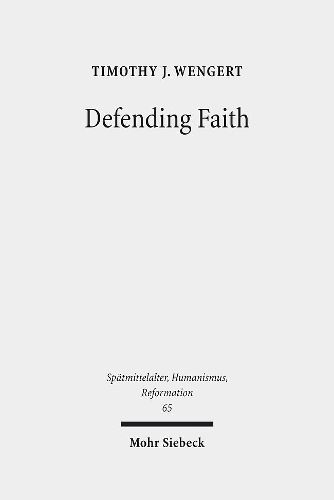Readings Newsletter
Become a Readings Member to make your shopping experience even easier.
Sign in or sign up for free!
You’re not far away from qualifying for FREE standard shipping within Australia
You’ve qualified for FREE standard shipping within Australia
The cart is loading…






Justification by faith alone defined teaching in Evangelical churches of the sixteenth century. In 1550 the former reformer of Nuremberg, Andreas Osiander (1498-1552), as a new professor of theology at the University of Koenigsberg in East Prussia, advocated a divergent understanding of that doctrine, arguing that a Christian’s righteousness consisted of the indwelling of Christ’s divine nature. In the ensuing years, almost all other Evangelical churches and theologians in German-speaking lands rejected his position. In this book Timothy J. Wengert studies their objections to Osiander’s theology in detail, offering a theological perspective on the process of confessionalization among Lutherans in the period after Martin Luther’s death in 1546 and before publication of the Book of Concord in 1580. Reactions against Osiander represented a singular literary event in the development of Evangelical churches in central Europe, with over 100 tracts for and against Osiander’s position being published between 1551 and 1559. The lines between so-called genuine followers of Luther and backers of Philip Melanchthon disappeared, as nearly all Lutheran theologians joined in the attack. Timothy J. Wengert, after providing an outline of Osiander’s position in an initial chapter, focuses on his opponents’ published responses. Not only does he provide a detailed chronology for these tracts, he also looks at the various theological themes struck by their authors. Separate chapters pay special attention to the contributions of Gnesio-Lutherans (Joachim Moerlin, Matthias Flacius and Nicholas Gallus), to the very different approaches to the dispute pursued by Johannes Brenz and Philip Melanchthon, especially after Osiander’s death, and to the struggle over Martin Luther’s writings and their authority. Philip Melanchthon’s contributions, especially a speech from 1551 and his 1556 commentary on Romans, are also examined.
$9.00 standard shipping within Australia
FREE standard shipping within Australia for orders over $100.00
Express & International shipping calculated at checkout
Justification by faith alone defined teaching in Evangelical churches of the sixteenth century. In 1550 the former reformer of Nuremberg, Andreas Osiander (1498-1552), as a new professor of theology at the University of Koenigsberg in East Prussia, advocated a divergent understanding of that doctrine, arguing that a Christian’s righteousness consisted of the indwelling of Christ’s divine nature. In the ensuing years, almost all other Evangelical churches and theologians in German-speaking lands rejected his position. In this book Timothy J. Wengert studies their objections to Osiander’s theology in detail, offering a theological perspective on the process of confessionalization among Lutherans in the period after Martin Luther’s death in 1546 and before publication of the Book of Concord in 1580. Reactions against Osiander represented a singular literary event in the development of Evangelical churches in central Europe, with over 100 tracts for and against Osiander’s position being published between 1551 and 1559. The lines between so-called genuine followers of Luther and backers of Philip Melanchthon disappeared, as nearly all Lutheran theologians joined in the attack. Timothy J. Wengert, after providing an outline of Osiander’s position in an initial chapter, focuses on his opponents’ published responses. Not only does he provide a detailed chronology for these tracts, he also looks at the various theological themes struck by their authors. Separate chapters pay special attention to the contributions of Gnesio-Lutherans (Joachim Moerlin, Matthias Flacius and Nicholas Gallus), to the very different approaches to the dispute pursued by Johannes Brenz and Philip Melanchthon, especially after Osiander’s death, and to the struggle over Martin Luther’s writings and their authority. Philip Melanchthon’s contributions, especially a speech from 1551 and his 1556 commentary on Romans, are also examined.